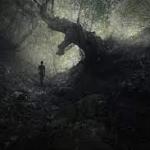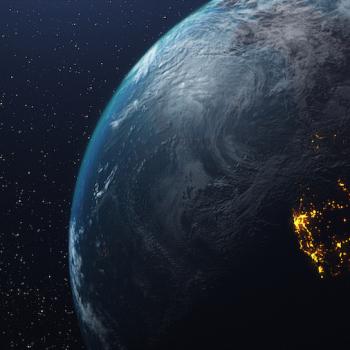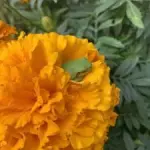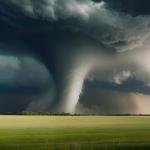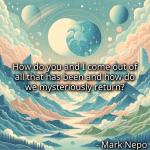 (The author of this piece prefers to remain anonymous.)
(The author of this piece prefers to remain anonymous.)
Below are selections of writings of three men: Nikos Kazantzakis, Rainer Maria Rilke, and the Chinese poet Li Po. Each of these selections, in its way, suggests the idea that the world needs aware, conscious beings to have existence. Or as Kazantzakis states it, Nature needs to evolve aware creatures so that she “sees her entire body for the first time.”
Rather than an omni-aware god, these writers present a blind, senseless Nature that slowly gropes through the ages of cosmic and biological evolution to finally bring forth eyes, ears and a brain so that Nature can look at and think about itself. Obviously, this is not a truth about the world, only a kind of poetic, mythic way of thinking about Nature and our relationship to it. But is the idea really so far-fetched?
Imagine that this universe with its billions of galaxies and trillions of stars, many with planets, each having its own long natural history. Yet from hot beginning to utterly cold end, no conscious life whatsoever emerges.
From this perspective, the old question, “If a tree falls in the forest and no one is around to hear it, does it make a sound?” could be rephrased as “if a universe existed and there was no one around to experience it, would it actually exist?”
Science suggests that there is no good reason to think that there is any purpose to the Universe. But this does not preclude that the Universe does have a purpose, only that we have no good reason for saying that it does. But actually, there is no particularly good reason for saying that it doesn’t, either. We simply don’t know why this Universe exists or why we are here as witnesses to its existence.
At any rate, the following selections invite us to think about the possibility that we do have a purpose and our purpose is to be the awareness of Nature. Thought of in these terms, Mindfulness is not merely an enhancement to our individual existence, but a fulfillment of our actual purpose. Even if not true, this idea provides a rather interesting basis for naturalistic mythic cosmology, one in which we actually have a purpose.
Selections for Kazantzakis
Earth rises up in the brain and sees her entire body for the first time.
She shudders; she is a beast that eats, begets, moves, remembers. She hungers; she devours her children – plants, animals, humans, thoughts – she grinds them in her dark jaws passes them through her body once more, then cast them again into the soil.
She recalls her passions and broods upon them. Her memory unfolds within our heart.
It is the entire Earth which leaps and throbs in our blood.
– – – – – – – – – – – – – — – – – — – – — – —
An erotic wind blows over Earth, a giddiness overpowers all living creatures till they couple in the sea, in caves, in the air, under the ground, transferring from body to body a great incomprehensible message.
Only now, as I feel the onslaught behind me, do I begin dimly to apprehend why the animals fought, begot, and died; and behind them the plants; and behind these the huge reserve of inorganic forces.
I am moved by pity, gratitude, and esteem for these old comrades-in-arms, that toiled, loved, and died to open a road for our coming.
Selection from Rilke
The hours is striking so close above me,
So clear and sharp,
That all my senses ring with it.
I feel it now: there’s a power in me to grasp and give shape to my world.
I know that nothing has ever been real
Without my beholding it.
All becoming has needed me.
My looking ripens things
And they come toward me, to meet and be met.
(Editors note: Rilke’s statement about nothing being real without his beholding it may sound rather solipsistic, but I’d suggest that the word “I” in this poem does not refer to Rilke, but to each and every “I”, every subjective being.)
Selection from Li Po
The birds have vanished into the sky,
And now the last cloud drains away.
We sit together, the mountain and me,
Until only the mountain remains.
Notes:
Kazantzakis selection is from the book The Saviors of God, modified from the Kimon Friar translation.
Rilke selection is from the Rilke’s Book of Hours, translated by Anita Barrows and Joanna Macy.
The Li Po selection is from The Enlightened Heart, and is translated by Sam Hamill.


